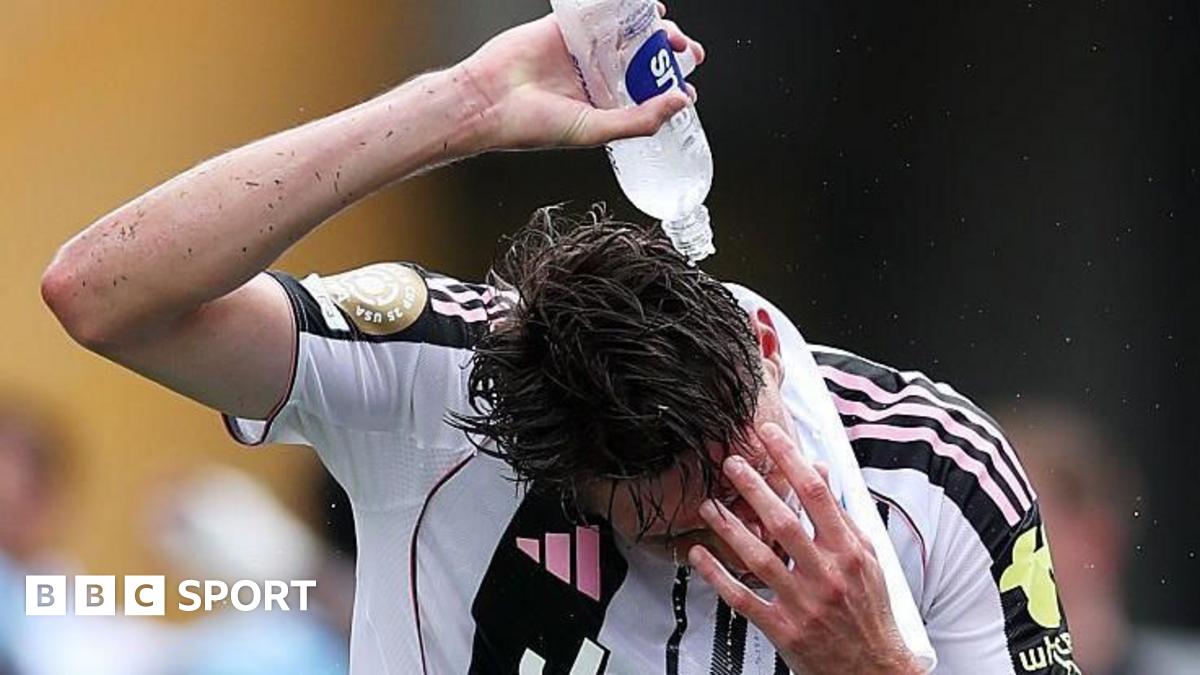The heat in Miami meant there were cooling breaks during Juventus' game against Real Madrid Ten Juventus players asked to be substituted during the Club World Cup defeat by Real Madrid, says manager Igor Tudor. The last-16 game on Tuesday was played in hot and humid conditions in Miami, with the temperature reaching 30C and humidity 70%. Up to five substitutions are permitted during a game, and up to six if it goes to extra time. Gonzalo Garcia's goal gave Real a1-0 victoryin normal time and Tudor made the maximum five changes allowed at Hard Rock Stadium. "In the end, 10 players asked to be substituted," he said. "The exhaustion was incredible. "There's the tension of this match, which burns your energy. Then there's this heat, which really gets to you, and the third thing that completes the conditions is playing in this humidity." Extreme heat in the US has affected many games during the Club World Cup, with Borussia Dortmund manager Niko Kovac saying he was "sweating like I've just come out of a sauna" during his side's group win over Mamelodi Sundowns in Cincinnati, Ohio. The temperature reached 36C during Benfica's group win over Bayern Munich in Charlotte, North Carolina, while Chelsea manager Enzo Maresca said it was "impossible" to organise normal training sessions amid a "code red" severe heat warning in Philadelphia. 'Cooling breaks' are mandatory once certain conditions are reached and they have been implemented in 33 out of 56 matches. Fifa guidelines currently rely on the wet bulb globe temperature (WBGT), a measure of heat stress combining temperature and humidity. If the WBGT exceeds 32C, cooling breaks are mandatory in both halves of a match. Global players' union Fifpro has said breaks should be introduced once the WBGT goes above 28C, and matches should be delayed if it exceeds 32C. The US will host next year's World Cup. A leading specialist on the effects of extreme temperature on the human bodytold BBC Sportthis week that Fifa should consider starting the final at 9am local time should there be similar conditions to those at the Club World Cup.
'Ten Juventus players asked to be substituted'
TruthLens AI Suggested Headline:
"Juventus Players Request Substitutions Due to Extreme Heat During Match"
TruthLens AI Summary
During a recent Club World Cup match against Real Madrid, ten players from Juventus requested to be substituted due to extreme exhaustion caused by the challenging weather conditions in Miami. The game took place in sweltering heat, with temperatures soaring to 30 degrees Celsius and humidity levels reaching 70%. Manager Igor Tudor confirmed that he utilized the maximum five substitutions allowed during the match, which ended in a 1-0 defeat for Juventus following Gonzalo Garcia's goal for Real Madrid. Tudor expressed concern over the physical toll the conditions had on his players, emphasizing that the combination of the match's intensity, high temperatures, and humidity significantly drained their energy reserves. He stated, "In the end, 10 players asked to be substituted. The exhaustion was incredible.", highlighting the unprecedented challenge posed by the weather during the match.
This extreme heat has not only affected Juventus but has also posed challenges for other teams participating in the Club World Cup. Managers from Borussia Dortmund and Chelsea noted similar struggles with the oppressive conditions, with Dortmund's Niko Kovac likening his experience to emerging from a sauna. FIFA has implemented 'cooling breaks' in response to high heat levels, which have been utilized in 33 out of 56 matches thus far. According to FIFA guidelines, these breaks are mandatory when the wet bulb globe temperature (WBGT) exceeds 32 degrees Celsius. Global players' union Fifpro has advocated for stricter measures, suggesting that breaks should begin at a WBGT of 28 degrees Celsius and that matches should be delayed if the temperature rises above 32 degrees. With the United States set to host the next World Cup, discussions are ongoing regarding the scheduling of matches to mitigate the risks associated with extreme heat, including proposals to start games earlier in the day to avoid the peak temperatures experienced during the Club World Cup.
TruthLens AI Analysis
You need to be a member to generate the AI analysis for this article.
Log In to Generate AnalysisNot a member yet? Register for free.
